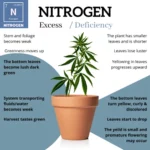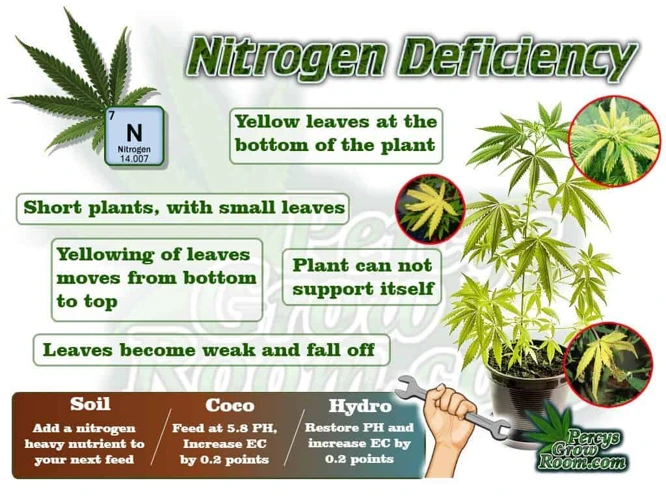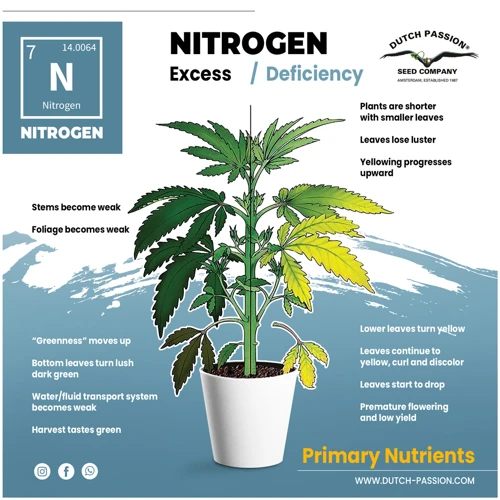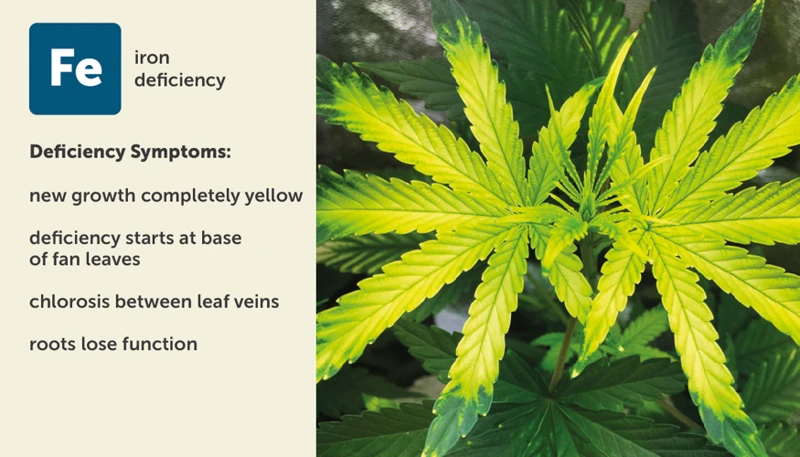
How to Identify and Treat Nitrogen Deficiencies in Cannabis Plants
Introduction:
Contents
As a cannabis grower, it is essential to ensure that your plants are receiving the right nutrients in the correct amounts to maintain optimal health and yield. One of the most critical nutrients that cannabis plants require is nitrogen. Nitrogen is essential for many vital functions of the plant, including photosynthesis and protein synthesis. However, sometimes, growers may encounter nitrogen deficiencies in their plants, which can result in stunted growth, yellowing leaves, and overall poor health. In this article, we will explore how to identify and treat nitrogen deficiencies in cannabis plants, as well as preventative measures you can take to keep your plants healthy and thriving.
What is Nitrogen Deficiency?
Nitrogen deficiency in cannabis plants occurs when there is a lack of available nitrogen in the soil for the plants to absorb through their roots. Nitrogen is an essential nutrient for plant growth, and it plays a critical role in the development of leaves, stems, and other plant tissues. Without enough nitrogen, cannabis plants will suffer from a range of symptoms that can impact their overall health and productivity.
Nitrogen is a crucial element in the production of amino acids, which are the building blocks of proteins. Proteins form the basis of cell structure and function, so without adequate nitrogen, plants cannot grow or develop properly. Nitrogen is also a key component in chlorophyll, the pigment responsible for photosynthesis. Photosynthesis is the process by which plants convert carbon dioxide and water into glucose and oxygen. Without enough nitrogen, a plant’s ability to carry out photosynthesis is severely hindered, leading to poor growth and development.
| Nitrogen Deficiency in Cannabis Plants |
|---|
| Lack of available nitrogen in soil |
| Essential nutrient for plant growth |
| Critical role in development of leaves, stems, and other tissues |
| Needed for production of amino acids |
| Key component in chlorophyll, responsible for photosynthesis |
| Can lead to poor growth and development |
Identifying and addressing nitrogen deficiency is crucial to maintaining a healthy, productive cannabis crop. By monitoring nitrogen levels regularly, choosing the right fertilizers, and using proper watering techniques, growers can help ensure that their plants have access to the nitrogen they need to thrive.
Why is Nitrogen Important for Cannabis Plants?
Nitrogen is one of the essential nutrients required for the growth and development of cannabis plants. This nutrient plays a vital role in many metabolic functions and is necessary for the production of proteins, enzymes, and chlorophyll. Without sufficient nitrogen, cannabis plants will not be able to carry out these functions and will struggle to grow properly.
Here are some reasons why nitrogen is so important for cannabis plants:
- It is a building block for proteins. Nitrogen is a primary component of amino acids, which are the building blocks of proteins. Without sufficient protein, cannabis plants will not be able to grow strong, healthy stems and leaves.
- Plays a key role in photosynthesis Nitrogen is a primary component of chlorophyll, the pigment that gives leaves their green color. Chlorophyll is essential for photosynthesis, the process by which plants convert light energy into chemical energy. Without chlorophyll, plants cannot produce energy and will die.
- Improves plant vigor Nitrogen is necessary for the growth of new leaves and shoots, which contribute to overall plant vigor. It is also necessary for the production of auxins, hormones that regulate plant growth and development.
In summary, nitrogen is essential for the growth, development, and overall health of cannabis plants. Without sufficient nitrogen, plants will struggle to carry out essential metabolic functions and will not be able to produce the proteins and pigments necessary for growth and survival.
Identifying Nitrogen Deficiency:
As a cannabis grower, it’s important to keep a watchful eye on the health of your plants. Nitrogen deficiency is a common issue that can have detrimental effects on the growth and development of your crop. By understanding how to identify this particular issue, you’ll be better equipped to take necessary steps to rectify the situation before it’s too late. The following signs and symptoms are indicative of a nitrogen deficiency in your cannabis plants.
Yellowing of Leaves
One of the most common signs of nitrogen deficiency in cannabis plants is the yellowing of leaves. At first, the leaves will start turning a lighter shade of green, but as the deficiency worsens, they will eventually turn yellow. This can occur on older leaves first, and in severe cases, the entire plant may turn yellow and die.
To identify yellowing of leaves caused by nitrogen deficiency, it’s important to look for the following symptoms:
- Yellow leaves: The leaves of the plant will turn completely yellow, indicating a lack of nitrogen in the soil.
- Yellow veins: In some cases, the veins of the leaves may remain green while the rest of the leaf turns yellow.
- Early yellowing: The yellowing of leaves usually starts at the base of the plant and moves up. This can happen in plants that are lacking nitrogen in the soil.
If left untreated, yellowing of leaves caused by nitrogen deficiency can lead to stunted growth in your cannabis plants, so it’s important to take action as soon as possible.
Slow Growth
One of the main signs of nitrogen deficiency in cannabis plants is slow growth. When a plant lacks sufficient nitrogen, it is not able to produce enough chlorophyll. As a result, the plant’s ability to carry out photosynthesis is reduced, which ultimately leads to slow growth.
There are several telltale signs of slow growth in cannabis plants that growers should be aware of. These include:
- Small Leaves: When a cannabis plant is lacking in nitrogen, it will often produce smaller than usual leaves. These leaves may be pale green, and they may appear almost transparent around the edges.
- Thin Stems: Plants that are suffering from nitrogen deficiency may also have thin, weak stems that are unable to support the weight of the plant.
- Limited Height: If a cannabis plant is not growing taller as quickly as it should, then nitrogen deficiency may be the cause. Plants that are lacking in nitrogen have a limited ability to produce new cells, which can stunt their growth.
It is essential for growers to identify slow growth as a sign of nitrogen deficiency early on. If left untreated, slow growth can lead to more severe symptoms and, eventually, the death of the plant. It is important to take action as soon as possible to provide the plant with the necessary nutrients to promote healthy growth.
Stunted Development
Stunted development is one of the key indicators of a nitrogen deficiency in cannabis plants. When a plant is experiencing a lack of nitrogen, its growth will slow down and it may become visibly smaller and weaker.
The following table summarizes the signs of stunted development in cannabis plants:
| Signs of Stunted Development | Possible Causes |
|---|---|
| Small plants | The lack of nitrogen may be causing the plant to grow more slowly and to be smaller than it should be. |
| Poor root growth | Nitrogen is necessary for the development of healthy roots. A lack of nitrogen may result in poor root growth, which can further contribute to stunted development. |
| Delayed flowering | Nitrogen is important for the development of healthy flowers. A deficiency in this nutrient may delay or reduce the flowering of the plants. |
To address stunted development in cannabis plants caused by nitrogen deficiency, it is important to take steps to increase the level of nitrogen available to the plants. This may involve using nitrogen-rich fertilizers, adjusting pH levels, and ensuring proper watering techniques to avoid overwatering or underwatering. It is also important to monitor nitrogen levels regularly and to choose the right fertilizers to prevent future deficiencies. By taking these steps, growers can help promote healthy growth and development of their cannabis plants.
Treating Nitrogen Deficiency:
Once you have identified a nitrogen deficiency in your cannabis plants, it is crucial to take immediate action to prevent further damage. Luckily, treating this deficiency is relatively straightforward with the right tools and techniques. By utilizing nitrogen-rich fertilizers, adjusting pH levels, and properly monitoring watering habits, you can help replenish the necessary nutrients and promote healthy growth in your cannabis crop. Keep reading to learn more about treating nitrogen deficiencies in your plants.
Use Nitrogen-Rich Fertilizers
Nitrogen-rich fertilizers can play a vital role in treating nitrogen deficiency in cannabis plants. When choosing a fertilizer, it is important to look for one that contains a high percentage of nitrogen. The most common types of fertilizers that contain nitrogen include ammonium nitrate, urea, and blood meal. These fertilizers can be applied directly to the soil or mixed with water and used as a foliar spray.
Organic fertilizers are also a good option as they can release nitrogen slowly over time. Bone meal, fish meal, feather meal, compost, and manure are all rich in nitrogen and can be added to the soil to help address nitrogen deficiency.
It is important to follow the instructions on the fertilizer packaging carefully when applying it to the soil or using it as a foliar spray. Over-fertilizing can lead to other nutrient imbalances and damage to the plant. Additionally, some fertilizers may have a pH level that is too high or low for cannabis plants, so be sure to test the pH level of the soil regularly and adjust it as needed.
Remember that supplementing with nitrogen-rich fertilizers is only a short-term solution for treating nitrogen deficiency. It is important to also address any underlying issues causing the deficiency and to adopt good soil management practices to ensure a healthy crop.
Adjust pH Levels
Maintaining proper pH levels is crucial for the overall health of your cannabis plants. When the pH level is too high or too low, the plants can’t absorb crucial nutrients, including nitrogen. To adjust pH levels, you can use various products available in the market such as pH up or pH down solutions. Here is a table showing the recommended pH levels for soil and hydroponic setups:
| Grow Medium | Ideal pH Range |
|---|---|
| Soil | 6.0 – 7.0 |
| Hydroponics | 5.5 – 6.5 |
When adjusting pH levels, it’s essential to measure the pH level of the water first and then add the pH up or down solution slowly in small amounts until the desired level is achieved. It is important to avoid sudden changes in pH levels, as this can shock the plants and cause further damage.
It’s also essential to remember that different nutrients are absorbed at different pH levels. For example, nitrogen is best absorbed at a pH level of 6.5, while phosphorus and potassium are better absorbed at a lower pH level of 6.0. Understanding the different nutrients’ pH requirements helps ensure proper nutrient uptake and a healthy plant overall.
Adjusting pH levels is a crucial step in treating nitrogen deficiency in cannabis plants. By ensuring that the pH range is within the recommended levels, you can help your plants absorb the necessary nutrients and promote healthy growth.
Avoid Overwatering or Underwatering
Proper watering techniques are essential when it comes to avoiding nitrogen deficiency in cannabis plants. Overwatering or underwatering can both lead to issues with nutrient uptake and eventually lead to deficient nitrogen levels.
Overwatering can cause the roots of your cannabis plants to become waterlogged, which can prevent the uptake of essential nutrients like nitrogen. This can also increase the likelihood of fungal growth and other diseases, which can further contribute to nutrient deficiencies. To avoid overwatering, make sure the soil has time to dry out between each watering. You can also consider using pots with drainage holes to help regulate water intake.
Underwatering is another common issue that can lead to nitrogen deficiency. When plants are not given enough water, they will start to wilt and their leaves may become yellow or brown. This can impede the absorption of nitrogen and other necessary nutrients. To avoid underwatering, make sure to water your plants regularly and monitor the soil moisture levels.
To prevent overwatering or underwatering, you can use a simple trick known as the “finger test.” Simply insert your finger into the soil up to the first knuckle. If the soil feels moist to the touch, it does not need more water. If the soil feels dry, it’s time to water your plants.
By following proper watering techniques, you can help ensure your cannabis plants are getting the right amount of nitrogen and other essential nutrients. This will enable them to grow and thrive, ultimately leading to a healthy and bountiful crop.
| Issue | Cause | Prevention/Treatment |
| Overwatering | Waterlogged roots, preventing nutrient uptake | Allow soil to dry out between waterings, use pots with drainage holes |
| Underwatering | Wilting plants, yellowing or browning leaves, impeding nutrient absorption | Water regularly, monitor soil moisture levels, use the “finger test” |
Preventing Nitrogen Deficiency:
As a cannabis grower, it’s important to stay ahead of any potential nutrient deficiencies that may harm your plants. One of the most common nutrient deficiencies in cannabis plants is nitrogen deficiency. However, the good news is that nitrogen deficiency can be prevented with the right techniques and tools. By implementing a combination of regular monitoring, choosing the right fertilizers, and proper watering techniques, you can help ensure that your cannabis plants receive adequate nitrogen throughout their growth cycle. Let’s dive into some preventative measures that you can take to avoid nitrogen deficiency in your cannabis plants.
Monitor Nitrogen Levels Regularly
One of the most important steps in preventing and treating nitrogen deficiency in cannabis plants is to monitor nitrogen levels on a regular basis. This involves keeping an eye on the nutrient content of the soil and making adjustments as necessary to ensure that the plants are receiving adequate amounts of nitrogen.
To monitor nitrogen levels, gardeners can use a variety of tools and techniques including:
1. Soil Testing: Soil testing kits allow gardeners to assess the nutrient content of their soil, including nitrogen levels. This information can be used to adjust fertilization practices as needed to provide the plants with the appropriate amount of nitrogen.
2. Leaf Analysis: Another way to monitor nitrogen levels is to perform leaf analysis. This involves taking a sample of the leaves and sending them to a lab for testing. Results from this analysis can help gardeners determine if their plants are suffering from nitrogen deficiency.
3. Visual Inspection: In addition to more scientific methods of monitoring nitrogen levels, gardeners can also do a visual inspection of their plants. This involves looking for signs of nitrogen deficiency, such as yellowing leaves or stunted growth.
By monitoring nitrogen levels regularly, gardeners can catch any issues with nitrogen deficiency early on and take steps to correct the problem before it becomes more serious. This can help ensure that plants remain healthy and produce a strong crop.
Choosing the Right Fertilizers
One of the keys to preventing nitrogen deficiency in your cannabis plants is choosing the right fertilizers. Not all fertilizers are created equal, and some can actually contribute to nutrient imbalances that can harm your plants.
When selecting fertilizers, it’s important to pay attention to the nitrogen content as well as the ratios of other nutrients. Look for fertilizers that have a high percentage of nitrogen, as this will help ensure your plants are getting enough of this vital nutrient.
However, you also want to make sure that the fertilizer you choose contains other key nutrients, such as phosphorus and potassium. These minerals are important for overall plant health and can help prevent other nutrient deficiencies from occurring.
It can be helpful to use a fertilizer that is specifically formulated for cannabis plants, as these products are designed to provide the ideal balance of nutrients for this particular crop.
When applying fertilizer, be sure to follow the instructions carefully and avoid overfeeding your plants. Overfertilization can be just as harmful as underfertilization, as it can lead to nutrient burn and other problems.
Here is a table of some popular fertilizers that contain high levels of nitrogen to help prevent and treat nitrogen deficiencies in cannabis plants:
| Fertilizer | Nitrogen Content | Other Key Nutrients |
|---|---|---|
| Grow Big by Fox Farm | 6-4-4 | Phosphorus, potassium, calcium |
| Miracle-Gro All-Purpose Plant Food | 24-8-16 | Phosphorus, potassium, iron |
| Big Bloom by Fox Farm | 0.01-0.3-0.7 | Phosphorus, potassium, calcium |
Keep in mind that this is by no means an exhaustive list and there are many other fertilizers on the market that can be effective at preventing and treating nitrogen deficiencies in cannabis plants. The key is to choose a high-quality fertilizer that is specifically formulated for cannabis plants and to follow the instructions carefully when applying it.
Proper Watering Techniques
When it comes to preventing nitrogen deficiency in cannabis plants, it’s important to pay attention to proper watering techniques to ensure that the plants receive adequate hydration without overwatering or underwatering. Here are some important tips to keep in mind:
- Avoid overwatering: Overwatering can limit the amount of oxygen available to the roots, leading to root rot and nutrient deficiencies. To prevent overwatering, allow the top inch or so of soil to dry out before watering again. Use a moisture meter to check the moisture level of the soil if you’re unsure.
- Water deeply: When it is time to water, make sure to do it deeply. This will help the water reach the roots, where they can absorb the nutrients they need. Watering deeply also encourages the roots to grow deeper, making them less susceptible to drought.
- Check drainage: Ensure that your planting medium has adequate drainage to prevent standing water. If the plant is in a pot, make sure there are drainage holes at the bottom and prop it up on a tray or saucer to catch any excess water that drains through.
- Water at the right time of day: Watering during the cooler parts of the day (early morning or evening) can help limit evaporation and ensure that the water reaches the roots where it is needed.
By following these proper watering techniques, you can help prevent nitrogen deficiency in your cannabis plants and promote a healthy and thriving garden.
Conclusion:
After identifying and treating nitrogen deficiencies in your cannabis plants, it’s important to take a step back and reflect on the importance of this process. Ensuring your plants have the proper amounts of nitrogen is crucial for their overall health and growth. By implementing preventative measures and regularly monitoring nitrogen levels, you can avoid stunted development and yellowing leaves. It’s important to remember that a healthy crop requires attention to detail and a willingness to adapt as needed. With these practices in place, you can enjoy a successful harvest and a bountiful yield.
Recognizing Nitrogen Deficiency is Crucial for a Healthy Crop
Recognizing nitrogen deficiency early on is essential for ensuring a healthy cannabis crop. Without proper levels of nitrogen, plants will struggle to grow, develop, and produce potent buds. Here are some key reasons why being aware of nitrogen deficiency is crucial for a successful harvest:
- Maximizes yield: Plants with adequate nitrogen levels grow quickly, produce more foliage, and ultimately, larger yields of high-quality buds.
- Prevents stunted growth: Nitrogen-deficient plants may suffer from stunted growth, which can severely limit the size of your harvest.
- Identifies underlying issues: Nitrogen deficiency can be a symptom of larger problems, such as issues with pH levels or imbalanced fertilization. Spotting a deficiency can help growers address the root cause of the issue before it worsens.
- Improves overall plant health: In addition to aiding in growth and development, adequate nitrogen levels also enhance plant immunity, making it less susceptible to pests and diseases.
Recognizing nitrogen deficiency is crucial for a successful cannabis harvest. By being aware of the signs and treating them promptly, growers can maximize their yields, prevent stunted growth, identify underlying issues, and improve overall plant health.
Frequently Asked Questions
How can I tell if my cannabis plant is deficient in Nitrogen?
You can identify nitrogen deficiency by looking for yellowing of the leaves, slow growth, and stunted development.
Why is nitrogen important for cannabis plants?
Nitrogen is a crucial element for plant growth, development, and overall health. It’s responsible for the production of chlorophyll and amino acids, which are essential for photosynthesis and protein synthesis.
What causes nitrogen deficiency in cannabis plants?
Nitrogen deficiency can be caused by a lack of nitrogen in the soil, improper pH levels, or over and under watering.
How can I treat nitrogen deficiency in my cannabis plants?
You can treat nitrogen deficiency by fertilizing your plants with nitrogen-rich fertilizers, adjusting pH levels, or avoiding over or under watering.
What are some examples of nitrogen-rich fertilizers?
Examples of nitrogen-rich fertilizers include blood meal, fish emulsion, and bat guano.
What is the best pH level for cannabis plants to absorb nitrogen?
The ideal pH level for cannabis plants to absorb nitrogen is between 6.0 and 7.0.
Can over-fertilizing my cannabis plants cause nitrogen deficiency?
Yes, over-fertilizing your plants can cause a buildup of salt in the soil, which can prevent your plants from absorbing nitrogen and other essential nutrients.
When is the best time to apply nitrogen-rich fertilizers?
The best time to apply nitrogen-rich fertilizers is during the vegetative stage of growth when the plant is actively growing and developing its foliage.
How often should I monitor nitrogen levels in my soil?
You should monitor nitrogen levels in your soil regularly, at least once every few weeks, to ensure that your plants are receiving the correct amount of nutrients.
Can nitrogen deficiencies be prevented?
Yes, nitrogen deficiencies can be prevented by monitoring nitrogen levels regularly, choosing the right fertilizers, and practicing proper watering techniques.





